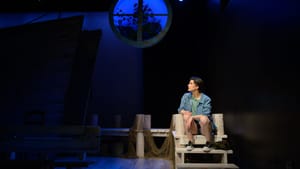Stay in the Loop
BSR publishes on a weekly schedule, with an email newsletter every Wednesday and Thursday morning. There’s no paywall, and subscribing is always free.
Walking on water
Azuka Theatre presents Christine Evans’s Galilee

A small town on the Great Barrier Reef ends up underwater, literally and figuratively, in Galilee, the final offering this season from Azuka Theatre. Climate change serves as a metaphor for personal stagnation in Christine Evans’s affecting but slightly undercooked dramedy.
Other plays have used global warming as a framing device to explore the bonds between people, like Nick Payne’s If There Is I Haven’t Found It Yet or Andrew Bovell’s When the Rain Stops Falling (seen locally at the Wilma in 2016). Evans shows how belief in science and concern for the changing world divides a community. In Galilee—the name of the Australian hamlet, not the biblical land where Jesus walked on water—changes in weather patterns and years of dubious practices have caused the once-fertile fishing industry to dry up.
Blending the personal and political
The state of the city distresses Carol (Zoe Nebraska Feldman), a local girl who returns home from studying marine biology after suffering a personal tragedy. She feels sympathy for her suddenly destitute neighbors and watches as the financial hardships trickle down to her mother Mardy (D’Arcy Dersham), who runs a hairdressing shop in town. But her belief in the human impact on the region’s vital waterways also pegs her as a “greenie activist.”
Evans excels at blending the personal and political. In scenes set at a waterside dive where Carol tends bar (designed with precise attention to detail by Dirk Durossette), the audience glimpses how the lives of the people who rely on fishing have been destabilized. These include Jimmy (David Bardeen), a spotter left with permanent cognitive disabilities after a bad diving accident, and Jemima (Ryane Nicole Studivant), a fourth-generation boat captain who watches her family’s legacy disintegrate overnight. Evans renders these characters with humanity and never uses them simply as mouthpieces for ideology.
The play also shows how areas that are struggling economically become boomtowns for unscrupulous investors. A disturbing subplot shows Harry (Adam Howard), a slick American businessman, swooping in to exploit Mardy’s bad luck. Although the conclusion of this episode is somewhat telegraphed, Dersham portrays the desperation of a woman who’ll do anything to keep her livelihood afloat with wrenching clarity.
Insight and ambition
Under Rebecca May Flowers’s fast-paced direction, the performances are uniformly superb, with Bardeen doing career-best work presenting Jimmy’s rapidly deteriorating mental stability. Howard makes for a prickly villain—convincingly sympathetic one moment, slyly malevolent the next. Studivant infuses Jemima with a larger-than-life personality that makes the ultimate revelations about the troubled end to her career all the more devastating.
Feldman, a recent University of the Arts graduate, is superb as Carol, holding the stage with great charisma as the story’s narrator. Unfortunately, it is in telling Carol’s story that Evans sometimes loses her narrative focus. The reason for Carol’s withdrawal from university is rendered as little more than a plot device, one that comes and goes as needed. Her relationship to Harry, whom she knew when he was a foreign exchange student, is similarly telegraphed, although Feldman and Howard bring tension to their exchanges.
It feels odd when the main character in a play is also the least defined, but Galilee doesn’t suffer from a lack of insight or ambition. Evans keenly shows how the environment affects people, and in turn, the impact we have on the world. More importantly, she understands how people come together to support one another through the most trying times.
What, When, Where
Galilee. By Christine Evans, directed by Rebecca May Flowers. Pay-what-you-can. Through May 21, 2023, at the Proscenium Theatre at the Drake, 302 S Hicks Street, Philadelphia. (215) 563-1100 or azukatheatre.org.
Accessibility
The Drake is a wheelchair-accessible venue with private, all-gender restrooms.
Masks are required. All Wednesday evening performances will be sold at a reduced capacity to allow for social distancing.
Sign up for our newsletter
All of the week's new articles, all in one place. Sign up for the free weekly BSR newsletters, and don't miss a conversation.

 Cameron Kelsall
Cameron Kelsall